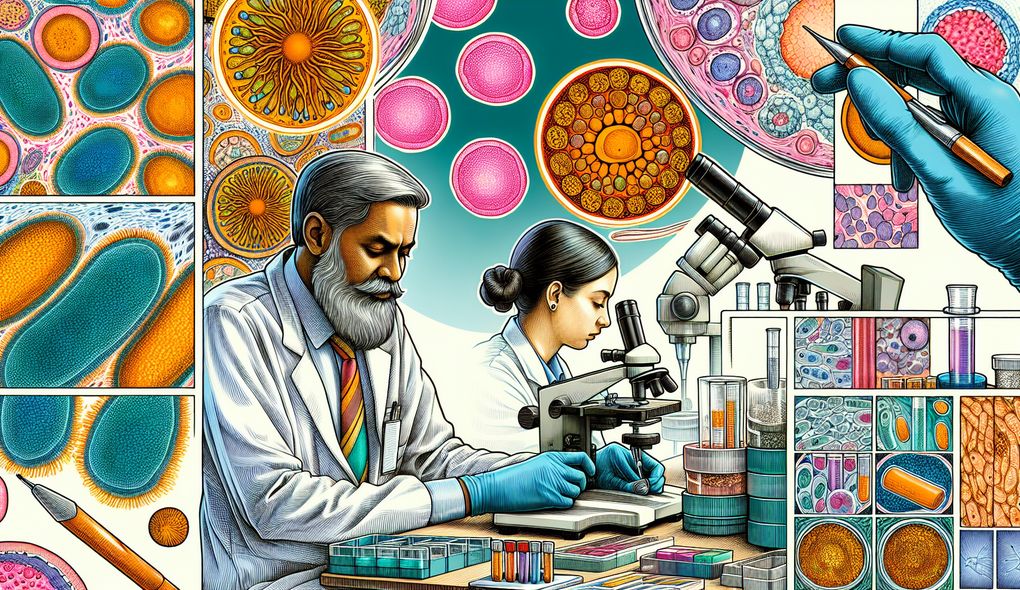What is your process for examining cell samples to detect abnormalities or diseases?
JUNIOR LEVEL

Sample answer to the question:
My process for examining cell samples to detect abnormalities or diseases involves several steps. First, I carefully prepare the cytological specimens, ensuring they are properly labeled and organized. Then, I perform microscopic analysis, carefully observing the cells under the microscope and looking for any abnormalities or signs of diseases. I document my findings accurately and maintain detailed records for all the analyses performed. Additionally, I collaborate with other pathologists and healthcare practitioners to discuss and solve any diagnostic problems that may arise. Finally, I stay updated with the latest techniques and advancements in cytopathology to ensure that I am providing the most accurate and effective diagnoses.
Here is a more solid answer:
In my process for examining cell samples to detect abnormalities or diseases, I rely on my strong analytical and critical thinking skills. Firstly, I ensure that the cytological specimens are properly labeled and organized, paying close attention to detail. Using good manual dexterity, I carefully prepare the samples for analysis, ensuring that they are processed according to established protocols. When performing microscopic analysis, I use my keen observational skills to identify any abnormalities or signs of diseases, relying on my extensive knowledge of cellular morphology. I document my findings accurately, maintaining detailed records to ensure the traceability of my work. In addition, I effectively communicate with other pathologists and healthcare practitioners, collaborating on challenging cases and seeking their input to achieve more accurate diagnoses. I am also proficient in using laboratory information systems to input and retrieve data efficiently. Finally, I thrive under pressure and can make accurate decisions quickly when faced with urgent cases, prioritizing patient care and ensuring timely diagnoses.
Why is this a more solid answer?
The solid answer addresses each evaluation area mentioned in the job description and provides specific examples and details to demonstrate the candidate's skills and experience in each area. It also aligns with the specific requirements mentioned in the job description. However, it can be further improved by providing more specific examples or experiences related to the candidate's past work or projects.
An example of a exceptional answer:
My process for examining cell samples to detect abnormalities or diseases is a comprehensive and systematic approach that encompasses all the necessary steps for accurate diagnosis. Firstly, I meticulously review the patient's medical history and any relevant clinical information to gain a comprehensive understanding of the case. This information helps me identify potential areas of concern and guides my analysis. I then carefully prepare the cytological specimens, ensuring proper fixation and staining techniques are used to optimize cell preservation and visualization. During microscopic analysis, I apply advanced imaging techniques and utilize cutting-edge diagnostic tools to enhance my observations, allowing for more precise identification of abnormalities or patterns indicative of diseases. I maintain a strong focus on quality control throughout the process, regularly participating in proficiency testing programs to ensure the accuracy and reliability of my results. In addition to my technical skills, I actively engage in ongoing professional development, attending conferences and reading scientific literature to stay abreast of the latest advancements in cytopathology. Moreover, my effective communication skills enable me to collaborate seamlessly with interdisciplinary healthcare teams, discussing challenging cases, and seeking different perspectives to arrive at the most accurate and clinically significant diagnoses in a timely manner. Finally, my ability to work under pressure and make accurate decisions quickly allows me to handle urgent cases with confidence, ensuring optimal patient care.
Why is this an exceptional answer?
The exceptional answer goes above and beyond by providing additional details and examples to demonstrate the candidate's expertise and proficiency in each evaluation area. It showcases the candidate's comprehensive approach to examining cell samples, highlighting their advanced techniques, commitment to quality control, continuous learning, and effective communication skills. The answer demonstrates a deep understanding of the responsibilities and requirements of the role, as mentioned in the job description.
How to prepare for this question:
- Familiarize yourself with the latest techniques and advancements in cytopathology by reading scientific literature and attending relevant conferences or webinars.
- Practice your manual dexterity skills by handling different types of specimens or using simulation tools.
- Improve your analytical and critical thinking skills by regularly solving case studies or participating in diagnostic challenges.
- Enhance your communication skills by actively engaging in interdisciplinary discussions and seeking feedback from colleagues.
- Develop proficiency in using laboratory information systems by familiarizing yourself with the software commonly used in cytopathology laboratories.
- Prepare yourself mentally to work under pressure by simulating time-sensitive scenarios and practice making accurate decisions quickly. Consider seeking guidance from experienced cytopathologists to understand their approach and strategies in urgent situations.
What are interviewers evaluating with this question?
- Analytical and critical thinking skills
- Attention to detail
- Manual dexterity
- Communication skills
- Laboratory information systems
- Ability to work under pressure and make accurate decisions quickly

